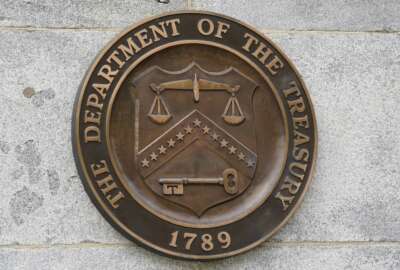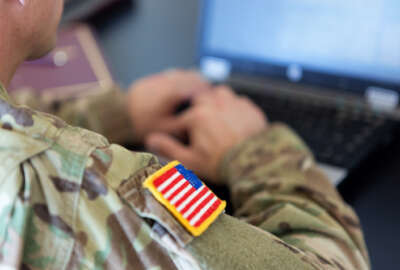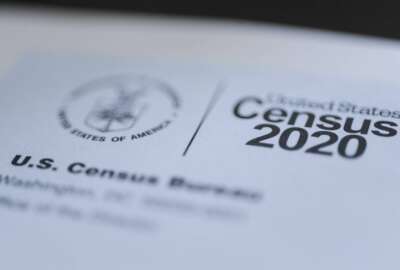Hubbard Radio Washington DC, LLC. All rights reserved. This website is not intended for users located within the European Economic Area.
National Guard makes case to keep citizen-soldiers operational, relevant
After a decade in which it has been built up to parity with the active Army and Air Force components, the National Guard should not be allowed to backslide to a...
wfedstaff | June 4, 2015 2:13 pm
The chief of the National Guard said Friday that after 10 years of war, the Guard is stronger than it’s been in its 350-year history. With those wars drawing down, he said he’s trying to make the case inside the Pentagon that the Army and Air Guard shouldn’t get left behind by budget cuts.
Gen. Craig McKinley said the Iraq and Afghanistan wars have paid a “war dividend” for both the Army and Air Guard: citizen-soldiers and airmen have received valuable combat experience, the services have been well-resourced and they’ve been tightly integrated into the fabric of the broader Army and Air Force branches they’ve been serving in.
The challenge now, he said, is making sure the Guard stays operationally relevant when the wars end. He said he’s also trying to make the case that the Guard is a good value proposition while the Pentagon is looking to save money. “By capitalizing on the investment made in the National Guard, this organization can arise at one of the best options available as the nation tries to concurrently preserve military capability while decreasing overall Defense expenditures,” McKinley told an audience at the Center for Strategic and International Studies. “An as needed force, nearly 85 percent of the National Guard is part time. National Guard members cost approximately one-third of their active-duty counterparts, especially when we’re not mobilized. National Guard appropriations count for less than 7 percent of DoD appropriations. We serve longer and retire later than our active duty counterparts, and that retirement costs one-tenth of the active duty.”
Value is clear
But McKinley said those figures were based on the Guard’s own data, not an independent analysis, and he said some people involved in internal Pentagon budget deliberations remain unconvinced and see the Guard as costly. His counterargument: that’s only because the Guard has been mobilized to such a large degree over the past decade.
“What we’re facing in the building is that people are saying this is a very expensive force as we’ve mobilized these 60,000 people over the last 10 years,” he said. “But that’s a very small snapshot in time. I would like an analysis of cradle-to-grave, enlistment to retirement, and I don’t think we’ve ever done that.”
McKinley also is arguing that DoD has invested so much in the Guard and Reserve components to get them up to par with the active components that it would be foolish to let that capability deteriorate now. 
But McKinley said making sure the Guard does get used on a regular basis in the years to come also will require a reexamination of some of the peacetime missions it performs.
And Lt. Gen. Harry Wyatt, director of the Air National Guard, said there are some DoD policy changes that could be made in order to ensure that the Guard’s soldiers and airmen are more available to commanders when they’re needed.
“We have a lot of policies that were in place during the Cold War and have not migrated or changed to allow easy access to the Guard and Reserve,” he said. “The example I think of is Haiti, where there was a feeling in the Pentagon that we have to give guardsmen and reservists 30 days notice to respond to that event. We were shaking our heads. We do this on a moment’s notice inside the United States, and we had guard units ready to go on a moment’s notice to help Haiti. But because of self-imposed policy, we were prevented from getting in there early.”
Reexamination of the Guard’s role
Another relic of the Cold War, according to McKinley, is the mission set that’s given to the Guard. He said he wants a reexamination of the functions the Guard is used for.
“Both the Air Force and the Army understand we have civilian-acquired skills that could be used in cyber for example,” he said. “Rather than go out and create little niche missions, which is kind of where we are today, I want to work with (U.S. Cyber Command Commander) Gen. (Keith) Alexander and contribute Army guardsmen and Air guardsmen to his force so we can utilize the most skilled people we have out in the field. That’s our next step. We don’t need to have a cyber Pearl Harbor to discover that we need to plan for this.”
Wyatt said if the military were a stock market, he’d be buying shares in remotely piloted aircraft and in cyber. The guard already is playing a role in both areas, but said he thinks cyber in particular is a field where the Guard can offer value. He said the military and its cyber command simply can’t compete, from a salary standpoint, with what the private sector is paying to train and retain cyber experts. And when the military does train young soldiers with cyber skills, they tend to cycle out of the military after a tour or two.
“And so rather than lose them from the military forever, we think the niche for the Air National Guard is to provide units where they will work in their civilian life, let them make those high dollars in the civilian workforce, but on drill weekend or maybe even whenever they want to, come and work for the National Guard and be challenged in some areas they won’t be challenged in their civilian life,” he said. “We’ve already seen that.
We’ve got a cyber warrior in Washington State that flies on his own dime on drill weekend to Fort Meade to do battle folks across the world. That’s what we think we can offer. We can capture some of that talent that’s trained within the Air Force and not let it separate, but rather transition to further service to the country.”
Wyatt said the Air National Guard also is trying to funnel more private sector cyber expertise into the military. Guard units in several states have set up cyber centers of excellence around major technology corridors across the country, he said.
“In those areas like Delaware, like Washington State, like Silicon Valley, like Austin, Texas, we’re standing up cyber forces working with [Air Force Cyber Command] for presentation of the forces to Gen. Alexander,” he said.
McKinley said it’s far too early to tell how the National Guard will fare out of the Pentagon’s comprehensive budget review, especially with the added murkiness that comes from the unfinished business of the Congressional supercommittee. But he said unlike in past eras, the Guard is part of the deliberations, and he said his arguments are being heard inside the Pentagon.
“Our case is to present the National Guard as a force to rely on, a force that is competent and capable, and if integrated properly can be an advantage during a fiscally-constrained environment,” he said. “Those are the themes that we’re following.”
RELATED STORIES:
Joint Chiefs argue against National Guard representation
Workforce one of three keys to Army cyber future
Air Force cyber unit reaches milestones
Copyright © 2024 Federal News Network. All rights reserved. This website is not intended for users located within the European Economic Area.
Jared Serbu
Jared Serbu is deputy editor of Federal News Network and reports on the Defense Department’s contracting, legislative, workforce and IT issues.
Follow @jserbuWFED





